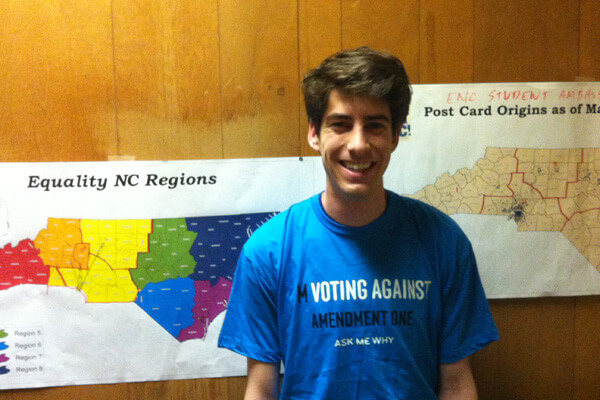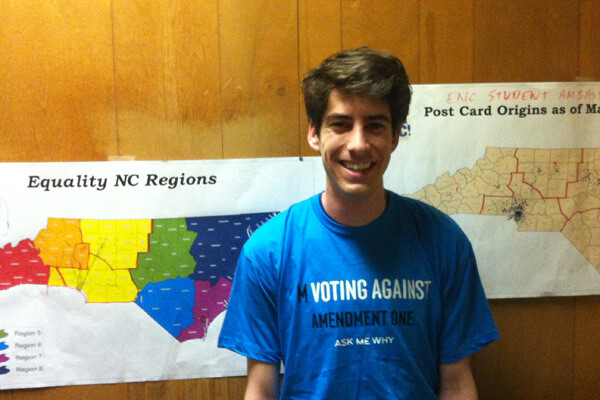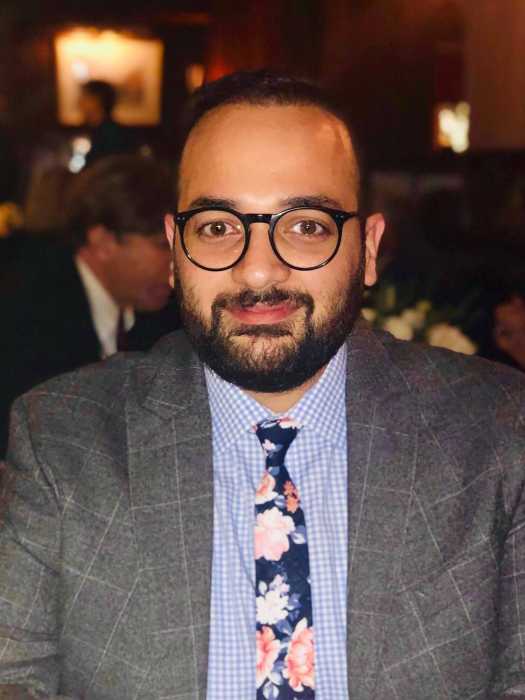On the final weekend before the North Carolina primary, with polls showing a constitutional amendment ballot question barring marriage by same-sex couples enjoying a comfortable lead –– but also most voters still unaware how far-reaching the measure was –– the LGBT community continued to press on.
With its allies, many on the state’s college campuses, others from faith communities and other progressive causes, queer activists mobilized to educate voters and pull out the “no” side.
Among those on the ground was Jacob Combs, a 23-year-old man who has lived in Chelsea since last fall.
In the end, the effort fell well short. As Gay City News went to press, with half the precincts reporting, the anti-gay amendment had a better than 60–40 edge.
The effort to defeat the anti-gay measure, Amendment One, was led by the Coalition to Protect North Carolina Families, a broad array of organizations whose steering committee included Equality North Carolina, the state’s LGBT rights group, the Human Rights Campaign, and the American Civil Liberties Union-NC. The Coalition had the support of the state Democratic Party and the North Carolina chapters of the NAACP, NARAL Pro-Choice, and the National Organization for Women.
Among organizations from around the country that jumped into the effort to beat back Amendment One was the Courage Campaign, a netroots-based progressive advocacy group out of California that has played a critical public education role in the ongoing fight against Proposition 8 and in monitoring the efforts of anti-marriage equality forces nationwide.
Combs, who juggles a full-time job at a CGI animation studio in Connecticut with a part-time online writing position with the Courage Campaign, was one of a dozen activists from the group in North Carolina in the campaign’s final days to pitch in on the get-out-the-vote (GOTV) push.
In a phone interview with Gay City News from Raleigh, Combs explained that his work with Courage and, especially, his trip to North Carolina are motivated by his unwillingness to miss out on key opportunities to make a difference.
The Los Angeles-area native said he learned the hard way about finding himself away from where the action is. In the fall of 2008, when his home state voted on Prop 8, he was a 19-year-old sophomore at Brown University –– in Providence, Rhode Island.
“I felt frustrated that I wasn’t able to be part of the ground operations to fight that amendment,” he said, explaining the Prop 8 campaign coincided with his own coming out as a gay man.
After graduating from Brown in the spring of 2011, but before his move to New York, Combs devoted his summer to teaching high-achieving, low-income youth in San Francisco. During his time back in California, New York, which would soon be his home, enacted marriage equality after weeks of drama –– and attendant grassroots activism –– about whether the Republican State Senate would allow a vote on the question.
“I thought, oh my God, I’m in the wrong place again,” he said.
Within months of arriving in Manhattan, Combs made sure he would be part of the marriage movement going forward. He first learned about the Courage Campaign, he said, from reading the group’s Prop 8 Trial Tracker, a blog that initially focused on the courtroom drama of the American Foundation for Equal Rights’ federal lawsuit challenging the amendment’s constitutionality. Over the past three years, the blog has expanded its mission considerably, now documenting the efforts of anti-gay forces determined to block or roll back marriage equality and other partnership advances.
Today, Combs writes for the Trial Tracker, often translating legal arguments and rulings into language non-lawyer readers of the blog can appreciate. An English and music major at Brown, he has no legal training, but said his work teaching over the years has given him a facility for communicating complicated concepts in ways that make them accessible to a general audience.
Combs said he spent much of Saturday at Raleigh’s annual LGBT Pride celebration recruiting volunteers willing to work on the GOTV effort in the 72 hours through the end of voting at 7:30 Tuesday evening. He found a lot of enthusiasm –– his team, he said, filled their quota halfway through the afternoon and had to dash back to the office and retrieve more volunteer forms –– but also encountered lingering confusion about the precise effect the amendment would have.
In fact, voter uncertainty about the specific terms of Amendment One was a key hurdle facing those who worked to defeat it.
The language of the ballot question reads, “Constitutional amendment to provide that marriage between one man and one woman is the only domestic legal union that shall be valid or recognized in this State.”
A poll published May 6 by Public Policy Polling found a 55-39 edge in favor of the amendment. The same poll, however, found that only 46 percent of those surveyed understood that the amendment would bar any sort of legal recognition for gay and lesbian couples. That portion of voters opposed the measure by a 61-37 percent spread. When those surveyed were told that it would ban both gay marriage and civil unions, support fell to 39 percent, while opposition grew to 44 percent.
The Coalition to Protect North Carolina Families emphasized the threats the amendment poses not only to gay and lesbian couples but also to unmarried different-sex couples and widowed senior citizens. Domestic violence protections for unmarried women living with a male partner, for example, could be withdrawn under the terms of the amendment.
While in Raleigh, Combs held out hope that the “no” side was making progress in educating North Carolina residents about the full implications of Amendment One. He noted that in friendly districts, early voting, which ended at 1 p.m. on May 5, had matched or exceeded levels seen in the 2008 election, when the Obama candidacy generated unprecedented enthusiasm there.
As well, the other side’s intention of pulling out conservative voters by scheduling the ballot question the same day as the Republican presidential primary was thwarted by Mitt Romney’s success in vanquishing his challengers, while Democratic Governor Bev Perdue’s announcement earlier this year that he will not seek reelection led to a primary contest in that party.
Along with the dozen Courage Campaign staffers and volunteers on the ground in North Carolina, the group fielded another 350 volunteers who phone-banked from elsewhere in the nation, lending muscle to the efforts of the Coalition to Protect North Carolina Families.
A particularly powerful phone-banker –– of sorts –– in the final weekend was former President Bill Clinton, who recorded a message opposing the amendment used in robocalls across the state.
Despite that influential assist, Combs well understood that the “no” on Amendment One fight faced long odds.
“An upset on Amendment One tomorrow would, of course, be a thrilling victory,” he wrote on Trial Tracker the morning of May 7. “No matter what happens, though, the Coalition has run a historic campaign, and the vote will likely be much closer tomorrow than conventional wisdom has predicted.”
If the final returns sustain the 20-point margin that held during the first half of the evening’s vote count, however, the hopes of Combs and other pro-LGBT forces that they could make even a marginal dent in educating North Carolina voters about Amendment One’s dangers will have been cruelly dashed.


































